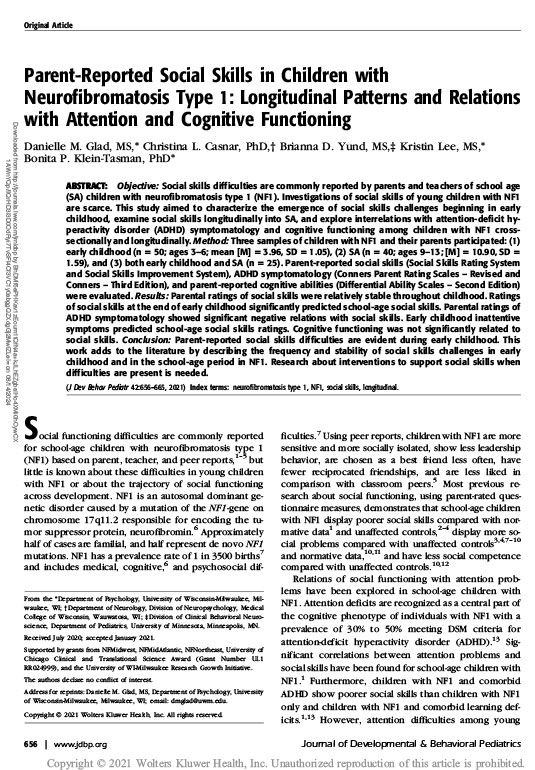Parent-Reported Social Skills in Children with Neurofibromatosis Type 1: Longitudinal Patterns and Relations with Attention and Cognitive Functioning
November 2021
Abstract
Objective:
Social skills difficulties are commonly reported by parents and teachers of school age (SA) children with neurofibromatosis type 1 (NF1). Investigations of social skills of young children with NF1 are scarce. This study aimed to characterize the emergence of social skills challenges beginning in early childhood, examine social skills longitudinally into SA, and explore interrelations with attention-deficit hyperactivity disorder (ADHD) symptomatology and cognitive functioning among children with NF1 cross-sectionally and longitudinally.
Method:
Three samples of children with NF1 and their parents participated: (1) early childhood (n = 50; ages 3–6; mean [M] = 3.96, SD = 1.05), (2) SA (n = 40; ages 9–13; [M] = 10.90, SD = 1.59), and (3) both early childhood and SA (n = 25). Parent-reported social skills (Social Skills Rating System and Social Skills Improvement System), ADHD symptomatology (Conners Parent Rating Scales – Revised and Conners – Third Edition), and parent-reported cognitive abilities (Differential Ability Scales – Second Edition) were evaluated.
Results:
Parental ratings of social skills were relatively stable throughout childhood. Ratings of social skills at the end of early childhood significantly predicted school-age social skills. Parental ratings of ADHD symptomatology showed significant negative relations with social skills. Early childhood inattentive symptoms predicted school-age social skills ratings. Cognitive functioning was not significantly related to social skills.
Conclusion:
Parent-reported social skills difficulties are evident during early childhood. This work adds to the literature by describing the frequency and stability of social skills challenges in early childhood and in the school-age period in NF1. Research about interventions to support social skills when difficulties are present is needed.

